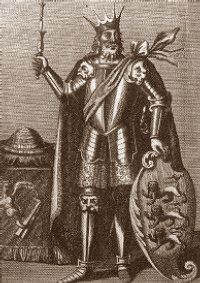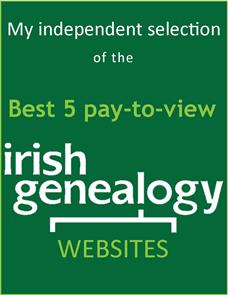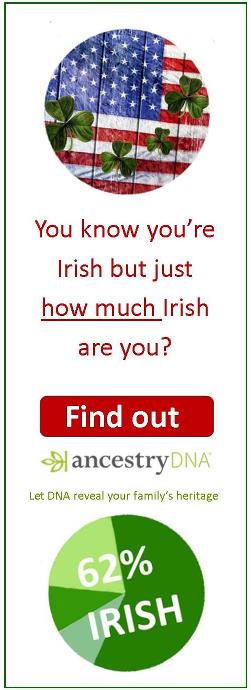- Home ›
- Irish Names ›
- Irish boys names, A-D
Traditional Irish boys names, A - D
Irish boys' names are largely drawn from tales of great warriors in Celtic Mythology or from early Ireland's regional kings. This isn't always immediately obvious because they've been adapted and changed spellings many times. But Brian is one of only very few Old Irish names that remains instantly recognisable.
 Brian Boru, High King of Ireland
Brian Boru, High King of IrelandBrian Boru is, by popular demand, history's greatest High King of Ireland who, as any Irish schoolboy will tell you, died at the Battle of Clontarf on Good Friday, 1014.
Such was his reputation that his name became extremely popular and was chosen with great pride for new-born sons through the centuries.
Even as a surname, when it it usually appears as O'Brien, it remains associated with the great warrior king. The name itself probably originated from the Celtic form Brigonos, from which the Irish name Bregon directly evolved, and changed first to Brion with two syllables and from then to Brian.
While Brian might be the greatest of all warrior names, there are others to choose from, as the list below shows.
The selection below is mine and by no means comprehensive. It includes some well-known Irish boys names as well as some that, though rarely encountered in recent times, may yet make a comeback if the current trend to seek out the unusual continues among new parents.
| Irish Name | Pronunciation | English equivalent | Meaning or Origin |
| Áed/Aodh | Ee | Hugh | Once the most common boys' name, it's been anglicised as Hugh, although there is no real connection with that name. |
| Aichear | e-har | Ehir | In Irish it might mean sharp, keen or fierce. Aichear was one of the musicians of the Fianna in the Finn Tales. Also spelt Aicher. |
| Ailbhe | Al-veh | Albert/ Bertie | Also a girl's name, Ailbhe suggests the colour white. Twelve warriors of the Fianna bore this name according to the Finn tales. Anglicised choices have no real connection. Also spelt Ailbe. |
| Áilgenán | Al-an-an | In Irish, it means a soft, mild person. Once the name of a Munster king, Ailgenan occurred mostly in the south. | |
| Ailill | Al-il | A spirit or elf. In the Finn Tales there were ten warriors of the Fianna called Ailil. It was once one of the most popular Irish boys' names but it's now rare. | |
| Ainéislis | An-esh-lish | Stanislaus | In Irish it might mean careful, thoughtful. Used to be popular around north Munster and south Connaught. Anglicised name has no real connection. |
| Alusdar | Al-as-dar | Alaistair | Greek Alexander. Introduced to the north of Ireland by Scots. Very popular among MacDonnells and MacDowells. |
| Annraoi | Own-ree | Henry | Brought to Ireland by the Anglo-Normans. Popular with the O'Neills of Ulster in the 15th century. |
| Aodhan | Ayd-awn | Aidan | In Irish, it means little fire. A common name in early Ireland. |
| Ardal | Awd-ahl | Arnold | In Irish it means great or high valour. Still reasonably popular. |
| Art | Art | Arthur | Borne by many early legendary kings of Ireland. Anglicised version has no real connection. Art is an ancient word for bear. |
| Bearach | Bay-rach | Barry | In Irish, pointed, sharp or spear-like. Also a girl's name. |
| Bran | Brawn | In Irish, a raven. One of the most popular Irish boy's names of early Ireland and in legend. | |
| Breandan | Bren-don | Brendan | From the Welsh for prince. One of the oldest Irish names. In existence since 6th century at least. |
| Brin/ Brian | Bree-an | Brian | In Irish, noble and strong. Original form was Brion. Brian Boru was the first high king of Ireland and defeated the Vikings at the Battle of Clontarf on 23 April 1014. |
| Caoimhín | Kiv-een | Kevin | Means comely child. Best known bearer of the name was St Kevin, founder of Glendalough Abbey. |
| Cathal | Caw-hal | Una | A common name during the Middle Ages, it means great battle warrior in Irish. Sometimes incorrectly anglicised as Charles. |
| Cian | Key-inn | Kane | Means 'ancient' and was the name of two legendary heroes. |
| Ciarán | Key-rahn | Kieran | In Irish, means dark or black. There are probably more Irish saints of this one name than any other. |
| Cillín | Kill-in | Killian/ Keelan | A 7th century Irish missionary to Europe. Name possible derives from Irish word for church. |
| Colm | Cul-lum | In Irish, means dove. Another very popular name among saints. | |
| Conán | Ku-nawn | Conan | A common name in early Ireland and, in legend, the name of two warriors of the Fianna. Means hound or wolf. |
| Conchobhar | Croo-hur | Connor/ Conor | Conchobhar MacNessa was one of the most famous kings of Ulster. Means lover of hounds. Sometimes incorrectly anglicised as Cornelius. |
| Conn | Kown | Conn of the Hundred Battles was a high king of Ireland in Irish legend. It remains a fairly popular name. | |
| Cormac | Cur-mock | Meaning unknown. Possibly raven. One of the most popular Irish boy's names down the centuries. | |
| Crónán | Cro-nahn | Cronan | The name of a 7th century abbot who founded a school which has survived to modern times. In Irish, the name means little brown one. |
| Damán/ Damhán | Dah-van | In Irish, it means little stag or ox. The name of a 7th-century king of Munster. | |
| Darragh | Dar-rah | Dara | In Irish, the word means oak. |
| Deaglán | Deg-lahn | Declan | A common name in Ireland and may date back to before St Patrick's arrival. |
| Diarmuid | Deer-mit | Dermot/ Jeremiah | Appears frequently in Celtic mythology and remains popular in Ireland. |
| Donncha | Dun-a-cha | A popular name, it means brown headed warrior. | |
| Donagh | Dun-ah | Name of Brian Boru's son. | |
| Dónal | Don-al | Donald/ Daniel | A big name for a child to handle: it means ruler of the world. |


